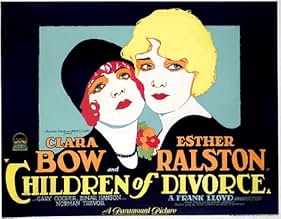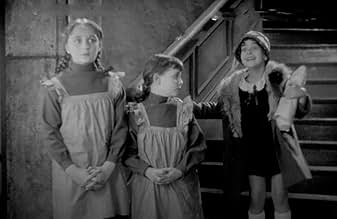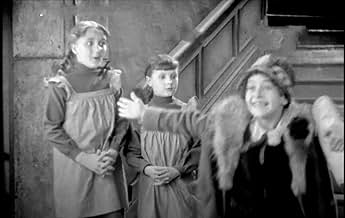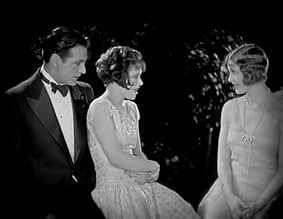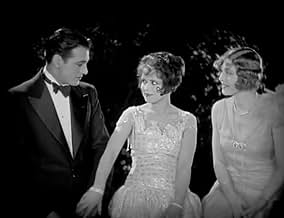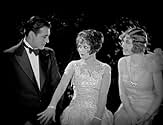A young flapper tricks her childhood sweetheart into marrying her. He really loves another woman, but didn't marry her for fear the marriage would end in divorce, like his parents'. Complica... Read allA young flapper tricks her childhood sweetheart into marrying her. He really loves another woman, but didn't marry her for fear the marriage would end in divorce, like his parents'. Complications ensue.A young flapper tricks her childhood sweetheart into marrying her. He really loves another woman, but didn't marry her for fear the marriage would end in divorce, like his parents'. Complications ensue.
Catherine Cotter
- Boarding School Student
- (uncredited)
Bill Elliott
- Party Guest
- (uncredited)
Featured reviews
Marriages, divorces,..mariages,divorce, ... ok, ok, , you want enjoy Life, but what about the children Hearts ?
This movie is a divorce trial and of wedding trial. To Avoid divorce try to succeed your marriage, it's seems evident but haw many people really think of that ?
Traumatised by abandon Kitty & Jean wanted 2 things, first never divorce, so make a good marriage.
It's such a moving Clara, who make you cry for sure, apparently she's seems happy, but inside juste broken and desperate, she always made the wrong things, thinking of course they was the best things to do,...
A movie who is still topical , even if actually divorced children are no longer abandonned.
Eternal questions: What is the way to succeed a marriage ? If it fails, divorce is a solution but how doing it softly for kids ? etc...
This movie is a divorce trial and of wedding trial. To Avoid divorce try to succeed your marriage, it's seems evident but haw many people really think of that ?
Traumatised by abandon Kitty & Jean wanted 2 things, first never divorce, so make a good marriage.
It's such a moving Clara, who make you cry for sure, apparently she's seems happy, but inside juste broken and desperate, she always made the wrong things, thinking of course they was the best things to do,...
A movie who is still topical , even if actually divorced children are no longer abandonned.
Eternal questions: What is the way to succeed a marriage ? If it fails, divorce is a solution but how doing it softly for kids ? etc...
Early in the 20th century, divorced ex-pat Americans living in Paris dropped their unwanted children at the local convents and visited them only when their busy schedules permitted. Kitty and Jean were among these lonely children, and the pair quickly become friends. One day, a young boy, Edward, who was also a child of divorced parents, appears, and both girls are smitten with him. Years pass, and the three meet up again in the U.S., where a romantic triangle develops, which expands into a square, when a gold-digging prince enters the scene. "Children of Divorce," which was written by Adela Rogers St. Johns from a novel by Owen McMahon Johnson, is a sudsy melodrama, whose dated appeal lies, not in the story, but in the stars.
The "It" girl herself plays the adult Kitty; vivacious Clara Bow is wonderful as the sexually aggressive woman, who needs to marry well. Jean, Kitty's protector as a child and now described as the richest woman in America, has grown into lovely Esther Ralston. Ralston, who seems to have been largely forgotten, gives a naturalistic performance as a caring understanding woman, who is capable of self sacrifice. However, Jean's money is like catnip to the impoverished Prince Ludovico, played by Einar Hanson, and his uncle, Duke Henri, played by Norman Trevor. But the Prince and his uncle have to compete with tall lanky Gary Cooper of the piercing blue eyes, who captivates both Jean and Kitty. As the adult Edward, Cooper has it all: startling good looks, wealth, education, and lack of ambition. Besides the three stars, Hedda Hopper as Kitty's self-absorbed mother also makes an impression, although the rest of the cast has unfortunately fallen into obscurity.
Besides the melodramatic plot, a few aspects of this silent film may be off putting to general audiences. While the sets are convincing, they are so tall they disappear into the clouds, and the gargantuan doors dwarf the performers. Although a few flourishes of the grand style intrude, the acting is generally natural and underplayed. The film is short, even shorter if the inter-titles are taken into account, and director Frank Lloyd maintains a good pace. However, "Children of Divorce" will likely appeal primarily to silent-film buffs. Already attuned to both the limitations and the pleasures of pre-sound movies, aficionados of silent cinema can overlook the unconvincing drama and relish the luminous stars. Indeed, they had faces then, and Clara Bow, Gary Cooper, and Esther Ralston provide ample evidence herein.
The "It" girl herself plays the adult Kitty; vivacious Clara Bow is wonderful as the sexually aggressive woman, who needs to marry well. Jean, Kitty's protector as a child and now described as the richest woman in America, has grown into lovely Esther Ralston. Ralston, who seems to have been largely forgotten, gives a naturalistic performance as a caring understanding woman, who is capable of self sacrifice. However, Jean's money is like catnip to the impoverished Prince Ludovico, played by Einar Hanson, and his uncle, Duke Henri, played by Norman Trevor. But the Prince and his uncle have to compete with tall lanky Gary Cooper of the piercing blue eyes, who captivates both Jean and Kitty. As the adult Edward, Cooper has it all: startling good looks, wealth, education, and lack of ambition. Besides the three stars, Hedda Hopper as Kitty's self-absorbed mother also makes an impression, although the rest of the cast has unfortunately fallen into obscurity.
Besides the melodramatic plot, a few aspects of this silent film may be off putting to general audiences. While the sets are convincing, they are so tall they disappear into the clouds, and the gargantuan doors dwarf the performers. Although a few flourishes of the grand style intrude, the acting is generally natural and underplayed. The film is short, even shorter if the inter-titles are taken into account, and director Frank Lloyd maintains a good pace. However, "Children of Divorce" will likely appeal primarily to silent-film buffs. Already attuned to both the limitations and the pleasures of pre-sound movies, aficionados of silent cinema can overlook the unconvincing drama and relish the luminous stars. Indeed, they had faces then, and Clara Bow, Gary Cooper, and Esther Ralston provide ample evidence herein.
Children Of Divorce has an honored place among films of Hollywood's wildest
child of the Roaring 20s Clara Bow It's also her second film with Gary Cooper with whom
she was getting wild with at the time.
According to the Citadel Film series book on the Films Of Gary Cooper, Bow saw him and raved like the rest of the American public in his breakout role in The Winning Of Barbara Worth. She got him a small role in her film coming up which was It and personally saw he was cast as the male lead in Children Of Divorce.
Two girls who met as kids and coming from divorced parents grow up to be Clara Bow and Esther Ralston. Esther is a good girl with firmly fixed ideas on morality and a man size crush on a boy who grows up to be Gary Cooper. Clara is not so good and she has a fool proof way of getting a man. In fact after a drunken orgiastic night they find themselves married.
Ralston who has a lot of bucks on her own gets nailed by an impoverished prince who played by Einar Hansson on the rebound. Hansson wants to start living like a prince for a change.
Bow is at her hedonistic best in Children Of Divorce. And as we all learned the movie camera just loved Gary Cooper. He was fortunate indeed to have a voice that matched that look when talkies came in.
Children Of Divorce is the kind of old fashioned morality tale that is unlikely to be remade today. One for fans of the stars.
According to the Citadel Film series book on the Films Of Gary Cooper, Bow saw him and raved like the rest of the American public in his breakout role in The Winning Of Barbara Worth. She got him a small role in her film coming up which was It and personally saw he was cast as the male lead in Children Of Divorce.
Two girls who met as kids and coming from divorced parents grow up to be Clara Bow and Esther Ralston. Esther is a good girl with firmly fixed ideas on morality and a man size crush on a boy who grows up to be Gary Cooper. Clara is not so good and she has a fool proof way of getting a man. In fact after a drunken orgiastic night they find themselves married.
Ralston who has a lot of bucks on her own gets nailed by an impoverished prince who played by Einar Hansson on the rebound. Hansson wants to start living like a prince for a change.
Bow is at her hedonistic best in Children Of Divorce. And as we all learned the movie camera just loved Gary Cooper. He was fortunate indeed to have a voice that matched that look when talkies came in.
Children Of Divorce is the kind of old fashioned morality tale that is unlikely to be remade today. One for fans of the stars.
Seems as though everyone's in love with everyone else in this soaper from what ultimately became Paramount Studios. There are good performances from all concerned, even from Gary Cooper in his first starring role. It is summarized by the reviewer from the Library of Congress above, and is a jumble of love shuffled among the various characters. The nominal star is Clara Bow, who here plays the 'heavy', but all eyes are on Gary Cooper, who subsequently became a huge Hollywood star. Esther Ralston has the supporting actress role and she is beautiful in a sympathetic part.
The film is what amounts to a polemic on the hazards of divorce but is not without merit. There are several poignant, sentimental moments which hold up due to some very competent performances, even by Cooper himself in his first big part. The year is 1927 and the film holds some very outdated views of marriage and divorce but, as often with silents, they must be viewed with a sense of atavism, as when one goes to a museum - or, in this case, a film festival. (Capitolfest, Rome, N.Y., 8/12/16.
The film is what amounts to a polemic on the hazards of divorce but is not without merit. There are several poignant, sentimental moments which hold up due to some very competent performances, even by Cooper himself in his first big part. The year is 1927 and the film holds some very outdated views of marriage and divorce but, as often with silents, they must be viewed with a sense of atavism, as when one goes to a museum - or, in this case, a film festival. (Capitolfest, Rome, N.Y., 8/12/16.
This tragic silent movie completely lives up to its title. The beginning of the movie shows a school for children whose parents are busy getting a European divorce. One mother drops her daughter off without a care in the world, and the lonely child quickly gets taken under the wing of a more experienced girl, whose mother is on her fourth divorce. The girls become very close, but a boy comes between them.
The older girl sees a boy at the "orphanage" and vows to marry him when she's older. She grows up into Esther Ralston, and the younger girl grows up to become Clara Bow. The boy is Gary Cooper, and while he and Esther have feelings for one another, Esther isn't as pushy as the beautiful flapper. Clara is impulsive and doesn't let a little thing like friendship stand in her way. After all, how can a child of divorce really respect and value marriage?
You've been warned: this is a heavy movie, and you'll probably shed a tear by the time it's all over. But if you love watching Clara Bow movies or want to see Gary Cooper in a silent movie, you can give it a chance.
The older girl sees a boy at the "orphanage" and vows to marry him when she's older. She grows up into Esther Ralston, and the younger girl grows up to become Clara Bow. The boy is Gary Cooper, and while he and Esther have feelings for one another, Esther isn't as pushy as the beautiful flapper. Clara is impulsive and doesn't let a little thing like friendship stand in her way. After all, how can a child of divorce really respect and value marriage?
You've been warned: this is a heavy movie, and you'll probably shed a tear by the time it's all over. But if you love watching Clara Bow movies or want to see Gary Cooper in a silent movie, you can give it a chance.
Did you know
- TriviaJosef von Sternberg was called in by Paramount to reshoot some scenes, shoot new scenes and recut the existing footage after executives made the determination that the film was not releasable.
- Quotes
Kitty Flanders: You'd make a marvelous second husband but you are too much of a luxury for a poor girl's first husband.
- ConnectionsFeatured in Hollywood (1980)
- How long is Children of Divorce?Powered by Alexa
Details
- Runtime
- 1h 10m(70 min)
- Sound mix
- Aspect ratio
- 1.33 : 1
Contribute to this page
Suggest an edit or add missing content


